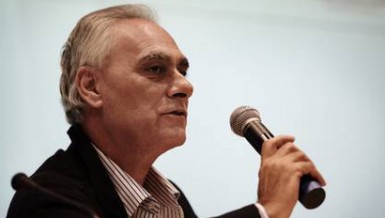
By James M Dorsey
As Lebanon, a country in which almost every facet of life is defined by sectarian fault lines, teeters in the shadow of the civil war in next door Syria, the country is also being rocked by multiple mushrooming sports scandals.
Months after a massive football match-fixing scandal became public and three international Lebanese referees were detained in Singapore for accepting sexual favours, Lebanon’s basketball team was forced to return home this month from the Philippines after the International Basketball Federation (FIBA) banned it from participating in international competitions. The ban was the result of political interference in a dispute in the Lebanese Basketball Association.
The scandals dashed government hopes that sports could help it maintain a sense of national unity inspired earlier this year by initial football successes in 2014 World Cup qualifiers – a tall order in a country of four million that is divided among 18 Muslim and Christian sects, scarred by 15 years of civil war that ended with a fragile peace in 1991 and whose largest political group, Hezbollah, has sided militarily with the embattled regime of Syrian President Bashar Al-Assad.
American University of Beirut political scientist Danyel Reiche describes professional sports and particularly football in Lebanon in an essay in Third World Quarterly as the sector with the most “direct confrontation among the different sectarian and political groups” because “whereas the political system prevents sects from competing with each other there are no separate sectarian (sports) leagues.” Quoting George Orwell, Reiche says Lebanese football amounts to “war minus the shooting.”
The scandals kicked off when the Asian Football Confederation (AFC) said in February it was investigating the involvement of players and administrative staff of the Lebanese Football Federation in match-fixing. In total, 20 players and an administrator were banned for life and fined $15,000 each.
The basketball scandal erupted in May when a Lebanese basketball championship quarterfinal match was cancelled between rivals Champville, which is backed by the Free Patriotic Movement of former president and Hezbollah ally General Michel Aoun, and Amchit that is chaired by current President Michel Suleiman’s son and backed by the Mustaqbal movement that is headed by Suleiman and caretaker Minister Mohammed Al-Safadi. The forfeiture of the match to Champville was prompted by tensions caused by Suleiman’s armed bodyguards.
Rejecting the decision, Amchit violated the Lebanese association’s rules by filing a lawsuit against Champville and the Lebanese basketball governing body, which in turn prompted the international ban. Amchit is backed by several other clubs, including one from a neighbouring country that is headed by an ally of the president, another that is owned by the minister of finance and a fourth in Beirut, that is affiliated with the country’s Sunni prime minister.
Amchit has since said it was dropping its lawsuit in the hope of FIBA lifting its ban after players protested against miring the sport with politics. The Amchit effort was thwarted when the club and its backers refused to sign a memorandum of understanding proposed by FIBA in which they would agree not to revert to the judiciary to settle disputes.
James M Dorsey is a Senior Fellow at the S. Rajaratnam School of International Studies as Nanyang Technological University in Singapore, co-director of the Institute of Fan Culture of the University of Würzburg, and the author of the blog, The Turbulent World of Middle East Soccer.



